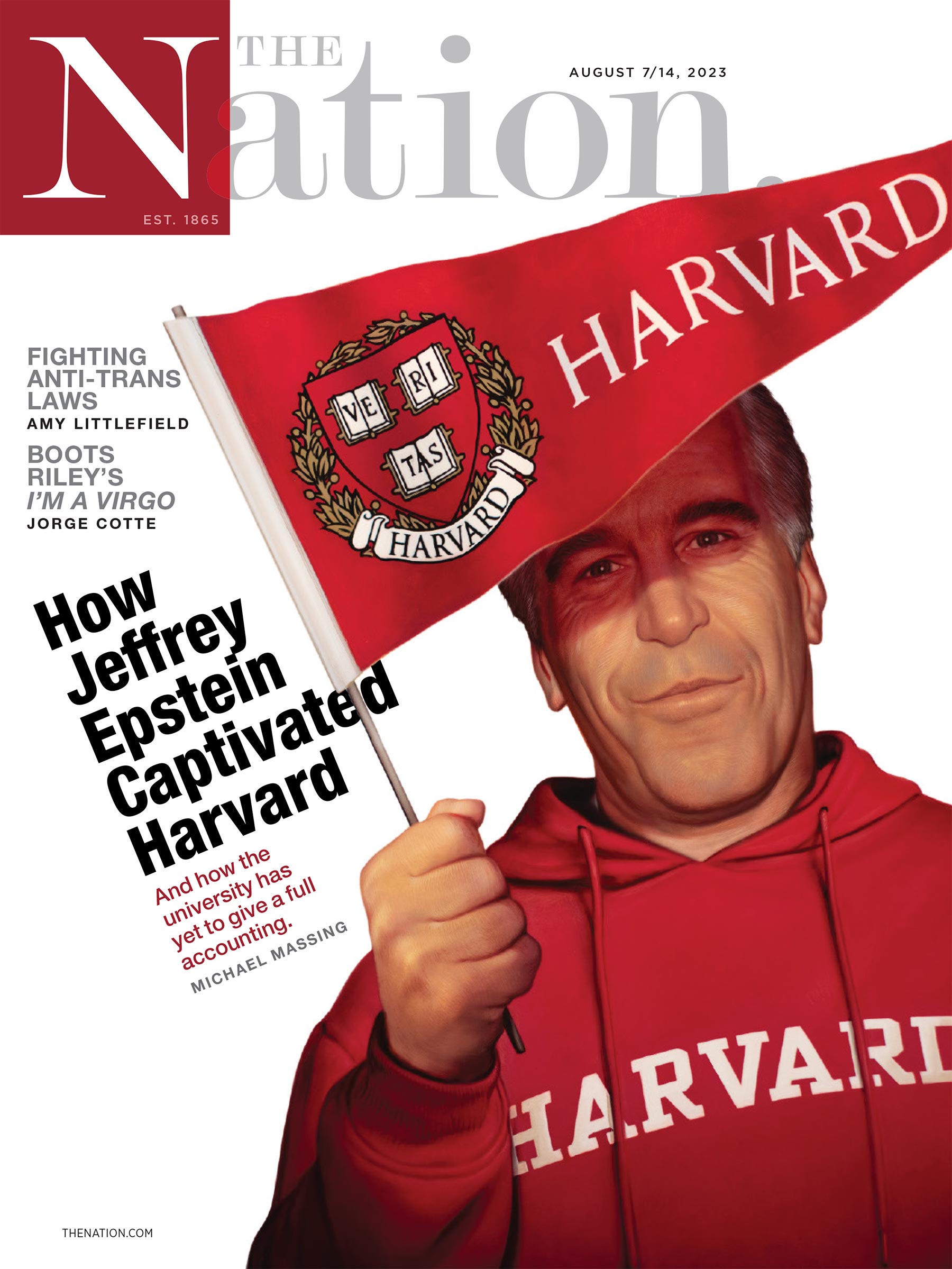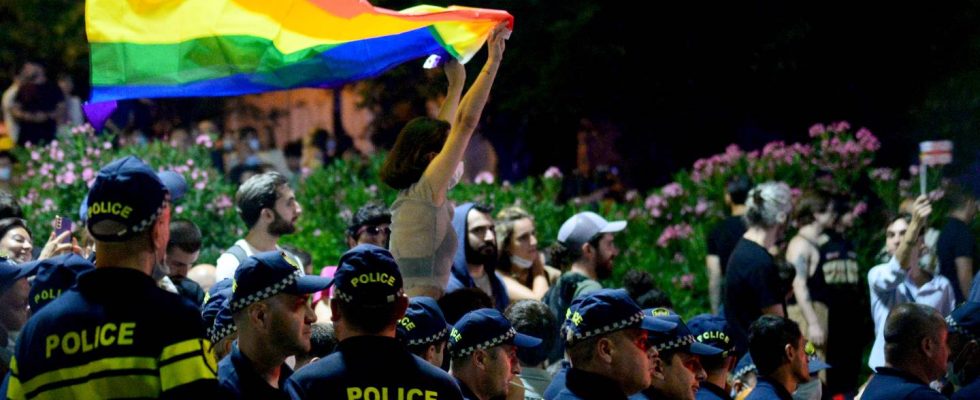Activism
/
StudentNation
/
August 4, 2023
The European Union requires the country to strengthen human rights. But leading up to Tbilisi Pride Fest, members of the ruling party continued to dehumanize LGBTQ residents.
Ana Subeliani followed the arc of the police officer’s finger across the map of the festival grounds. Here and here, he explained, his team would stop far-right counterprotesters from breaching the barricades and attacking the crowd at Tbilisi Pride Fest, the finale to the Georgian capital’s third-ever LGBQT Pride Week.
“It felt real and trustful,” Subeliani said. But as she prepared the grounds on the morning of the festival in July, as many as 2,000 protesters were already gathering at the outskirts of the park. Waving Georgian flags and chanting “Glory to Russia,” the protesters—almost all men and many wearing the black T-shirts of the conservative media outlet Alt-Info—pushed against lines of policemen.
Officers who had assured Subeliani that they would defend the event now came to her with a question: How many people did she have working?
“In two or three minutes, they started, ‘Evacuation!’ And we heard this screaming of the people and throwing stuff,” said Subeliani. Before she could protest, the police officers began running across the field, ushering organizers, volunteers, and artists into waiting mini-buses. “They didn’t give us any choice,” Subeliani said. “I immediately understood what happened.”
After evacuating, Tbilisi Pride organizers quickly responded on social media. “The attack on LGBTQ+ activists and Pride Fest was a well-planned operation orchestrated jointly by the Ministry of Internal Affairs and ‘Alt-Info’ against human rights and democracy,” they wrote on Facebook, referring to Georgia’s national law enforcement agency and the conservative Georgian TV outlet.
Tbilisi Pride’s statement captures queer Georgians’ struggle to publicly assert their identities and exercise their rights to speech, expression, and assembly against a ruling party that increasingly aligns itself with Russian authoritarianism. For the safety and well-being of queer Georgians, Tbilisi Pride advocates for European-style democracy. But until then, Pride organizers must limit and conceal their events, resulting in a Pride Week often solemn—and always political.
Current Issue

“Unlike maybe Western Europe or the US, Pride is not only a celebration. For us, for me, it’s resistance. It’s a fight,” said Mariam Kvaratskhelia, a codirector of Tbilisi Pride. “We are going against the most powerful institutions,” she added. “We are constantly under risk.”
Tbilisi Pride organizers argue that the government failed to protect them from physical threats from the very beginning. In 2019, organizers of the first Pride March canceled the event just hours before it would begin after far-right groups threatened violence online. “Gang formations were walking on the street with the crosses and trying to target the queer-looking people, and the police would not do anything,” Giorgi Tabagari, cofounder and codirector of Tbilisi Pride until 2021, said. “Until now these people are not arrested.”
After canceling the official march, Pride organizers called a few dozen trusted activists to protest in front of the MIA offices later that day. Their demonstration marked the first Pride March in Georgia. “We had the feeling that we won that year,” said Tabagari. “We achieved what we wanted, we occupied prime-time news, and we directly communicated with the public.”
Tabagari organized the first Pride March after multiple attempts by the government to suppress queer Georgians. In 2017, Parliament changed the Constitution to designate marriage as a “union of a woman and man for the purposes of creating a family.” That same year, Tabagari said, the MIA convinced queer organizers to call off a demonstration on International Day Against Homophobia, Biphobia, and Transphobia for fear of violence from far-right groups.
In the months leading up to this year’s Pride Fest, members of the ruling party, Georgian Dream, continued their attacks on queer residents, taking aim at LGBTQ “propaganda” and young people’s “mixed orientations.”
“This language that dehumanizes people is extremely, extremely dangerous and harmful,” said Erik Illes, head of development cooperation at the Swedish Embassy. “Because it leads to human suffering.” Kvaratskhelia argues that Georgian Dream officials regard queer activists as “foreign influence agents,” a maneuver that echoes the Kremlin’s treatment of LGBTQ protesters.
Popular
“swipe left below to view more authors”Swipe →
In a parallel to Russia’s own 2012 law, Georgian Dream considered a bill against “foreign agents” this March. Violent protests quickly forced the party to drop the bill, which would have designated organizations that receive at least 20 percent of their funding from abroad as “agents of foreign influence,” including Tbilisi Pride, which receives donations from the Dutch government, the American National Endowment for Democracy, and the UN Development Programme.
After a safe Pride Week last year, organizers trusted the MIA to protect this year’s events from interference by far-right groups. “We expect that, because of their political calculations, they want to do it and they will do it,” Kvaratskhelia said in the weeks leading up to Pride Fest. But in the days following organizers’ evacuation from the festival grounds, Subeliani felt betrayed by the MIA. “It’s so hard to understand that after these kinds of things they failed us, they lied to us, they planned all this against us.”
Illes considers the cancellation of Pride Fest a violation of constitutional rights and warns of deviating from the EU’s human rights standards for Georgia. “It is clear that this was a failure on behalf of state institutions in protecting the right of assembly and freedom of expression,” Illes said. “The EU was built on the facts and experiences of the Second World War and the experience of horrible violations against human rights,” he added. “The Georgian government needs to recognize that moving towards the approximation requires protection of minorities and human rights.”
In 2021, Tbilisi Pride organizers were also forced to cancel the march after authorities failed to restrain a far-right counterprotest. On the morning of the march, rioters attacked journalists preparing to cover the event. Fifty-three were injured, including a TV cameraman who died a week later. Later that day, rioters broke into Tbilisi Pride offices and terrorized organizers. “We were hunted all day in the streets,” Subeliani said. “As soon as I got to one location, the radicals would follow us, and—10, 15 minutes—they would catch us and throw stuff and sometimes even explode stuff.”
“It was shattering, heartbreaking,” said Tamar Kapanadze, the communications manager for Tbilisi Pride. “You realize your country—I mean your government, but your country does not care for you and you’re not important enough citizens for your rights to be protected.”
The following day, thousands of Tbilisi Pride supporters held a silent rally outside Parliament. Yet few of the rioters from 2021 have been prosecuted for their participation in the violence, and others have had their charges dropped. “There was a shift in how they operated, and what was OK and what was not before,” Tabagari said of the ruling party. “Now what we have is the most regressive group of politicians who are in power.”
By failing to protect LGBTQ rights, Georgian Dream further jeopardizes the country’s future with the European Union, which over 80 percent of Georgians support joining. Before approving Georgia’s application for candidacy status, the EU requires the country to fulfill 12 priorities, including the strengthening of human rights. But, by appealing to Orthodox Christian values, Russian and pro-Russian social media outlets promote the idea that LGBTQ rights threaten Georgia’s national character. “The narratives are spun right across this region because Russia doesn’t want Georgia to join NATO or the EU,” Clayton added. “It wants to keep Georgia in its back pocket, in its backyard, to manipulate it.”
Moreover, Subeliani doubts the role that EU membership would play in safeguarding LGBTQ rights in Georgia. She looks to Hungary, which has implemented sweeping anti-LGBTQ policies since it joined the EU in 2004, including banning same-sex marriage and adoption by same-sex couples. “I see the Hungarian experience. It shows me that being part of the EU is not a guarantee of the progress,” Subeliani said. “The change is something that we ourselves should achieve. We as a society, we need to choose what kind of society we want to be.”
Kvaratskhelia agrees that EU membership will not ensure queer Georgians’ civil rights. “We never say that LGBTQ rights should be protected if we want to be part of the EU,” said Kvaratskhelia. “We want LGBTQ rights to be protected because our citizens should be protected and should live in a dignified environment and an equal environment.”
Until then, Tbilisi Pride organizers must make hard choices to achieve their political goals, a reality that Tabagari sees across former Soviet republics. “Tbilisi Pride and the Eastern European Prides are political, and they are extremely political,” he said. “It’s not about expression necessarily. It’s about survival. It’s about finding your place in the society,” said Kvaratskhelia. “For us, Pride was a protest.”
-
Submit a correction
-
Reprints & permissions

